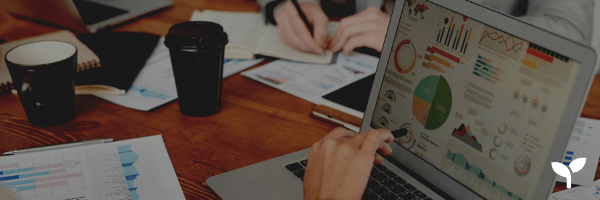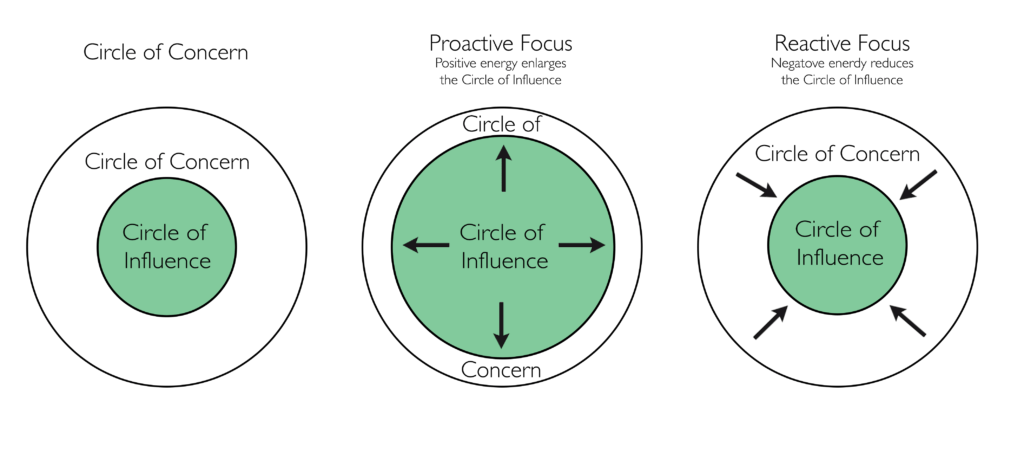
What Forecasting Can Do For You
26th November 2020
How to Live Above the Line – the OARBED model
1st March 2021In times of uncertainty, we often find it difficult to cope. So many things out of our control, changes to adapt to, new situations to muddle through, and the paradox of trying to keep calm in stressful times often causing more stress!
In The 7 Habits of Highly Effective People, Stephen Covey writes in detail about the Circle of Concern/Circle of Influence. It is actually written in terms or proactivity and efficiency, however it is also an incredibly powerful concept in times of uncertainty.

Firstly, it is perfectly natural when we are faced with a crisis to worry about all kinds of things – from the crisis itself, down to how we will cope each day – these are our concerns. And go into our Circle of Concern. However, within that circle, we have a smaller circle, our Circle of Influence. These are things that we can actually do something about.
Covey discusses the two options and the consequences of them: focusing on the things we can control, or focusing on the things we cannot control. He calls this Proactive Focus and Reactive Focus.
Proactive and Reactive Focus
Proactive Focus, focuses on the things we can control – our health, our behaviours etc. By working on the things you can tangibly do something about, the nature of your energy will be “positive, enlarging and magnifying”, which will grow your Circle of Influence, and reduce the Circle of Concern.
Reactive Focus, focuses on the Circle of Concern. Covey gives examples of other people’s weaknesses and the environment as two things that we often put a lot of energy into, but rarely benefit from spending time on. More recently, the Coronavirus pandemic caused a huge amount of uncertainty, but a lot of it was way out of our control. Those who choose Reactive Focus will often blame and accuse, and feel victimised. This will cause the Circle of Concern to squash the Circle of Influence.
So how do we increase our Circle of Influence?
First we look at Direct, Indirect, and No Control situations.
- Direct: problems involving our own behaviour
- Indirect: problems involving other people’s behaviour
- No Control: problems we can do nothing about
Direct Control can be improved by working on three habits that Covey outlines in his book (Be Proactive, Begin with the End in Mind, and Put Things First)
Indirect Control can be improved by changing our methods of influence. These are helped along by Covey’s next three habits – Think Win/Win, Seek First to Understand, then to be Understood, and Synergize.
No Control is something we have to learn and work harder on – to accept that there are things beyond our control, and learn to live with them.
Next we change our language.
Rather than using ‘have’, focus on using ‘be’. For example, rather than focusing on what we will have if we achieve success, focus on what we will be when we are successful. This forces us to think and act in ways that will enable us to be that person when success arrives. By using ‘be’ we are encouraging ourselves to focus on the one and only thing we can control – ourselves.
Your relationship will not improve if you ‘have’ a better partner – you work on yourself to be a better partner first, and the rest should theoretically follow. When faced with a pandemic, take action – create a Recovery Plan (you can find out our top tips on how to do this here ) and work out ways to protect your business and personal life, adapt it, and move on. When faced with a huge political change (notably Brexit in recent times) – work out what parts of it affect you, and take action to minimise their consequences.
These are the just the first steps to helping you focus on your Circle of Influence. For a more in-depth read, please read Stephen Covey’s book, The 7 Habits of Highly Effective People – it is an incredible read, and one that will not only benefit your business, but change the way you live your life. You can also find more information on the Franklin Covey website here.




